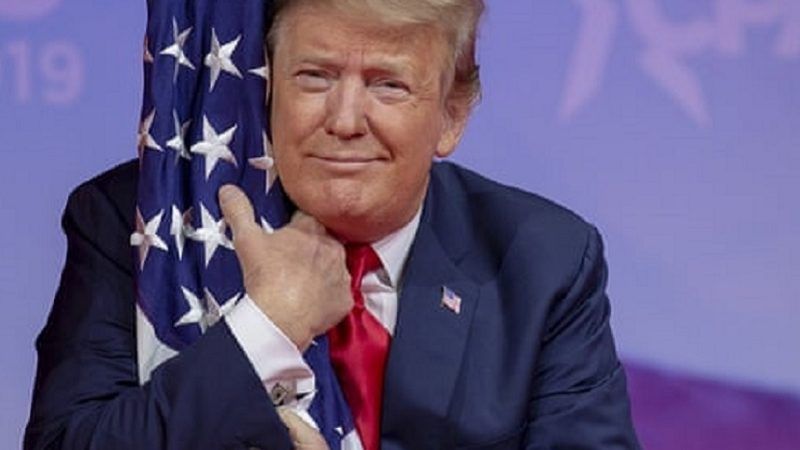Freedom for Me, Rule of Law for Thee
The right's response to the coronavirus lockdowns brings out a longstanding American paradox.

"How is it that we hear the loudest yelps for liberty among the drivers of negroes?" asked the British essayist Samuel Johnson on the eve of the American Revolution. Although regarded as one of the finest writers of the 18th century, Johnson wasn't a popular figure in America at that time. But he did point to a paradox about American politics, where high-minded defenses of freedom have long coexisted with the extreme curtailments of liberty.
McGill University's Jacob Levy maintains that this paradox didn't end with slavery: It has repeated itself with disturbing regularity in post–Civil War America.
And it's happening again in the pandemic, as the same right-wing movement that cheers President Donald Trump's draconian immigration crackdowns in the name of the rule of law is now in defiance mode against the lockdowns.
A lot of COVID-19 policies have gone overboard. In Michigan, where I live, the original 41-day lockdown has grown into two months and counting. The state's Democratic governor, Gretchen Whitmer, has eased some of her restrictions, but she has also added stringent (and nonsensical) new ones, including classifying more businesses as non-essential and barring them from opening. Worse, given that there is no vaccine in sight, the risk of secondary outbreaks is spawning containment schemes that will make an all-encompassing surveillance state a massive danger to civil and economic liberties, requiring constant vigilance..
But Johnson's line comes to mind when some of the critics of those liberty-busting restrictions turn around and endorse crackdowns on workers whose only crime is that the government refuses to give them papers to do jobs that Americans won't. President Trump, capitalizing on decades of anti-immigration activism, has built a political movement around not just chasing those people out of the country but targeting their employers and the cities that dare stand up to his policies.
Trump's first presidential pardon went to the notorious former Arizona sheriff Joe Arpaio, whose many human rights abuses include forcing an undocumented woman to deliver a baby while shackled. (Arpaio, who the pro-Trump radio host Rush Limbaugh once called a "national hero," was himself convicted for contempt of court because he ignored orders to stop racially profiling Latinos in his zeal to go after undocumented immigrants.) Since then, this administration's border policies have brought even worse atrocities, like snatching 5,500 children, including infants, from migrant parents and putting them in separate detention facilities without an effective tracking system to reunite them.
Now Trump is discovering individual liberties and tweeting that Whitmer and other blue-state governors should "LIBERATE" their economies. When one Michigan barber defied the state's rules and reopened his salon with the help of gun-toting militia members standing guard against the cops, there was sympathy not condemnation from the crowd that defends all sorts of border-control ugliness in the name of the "rule of law."
Six sheriffs in Michigan have declared they won't enforce their state's lockdown because they "question" some of the restrictions, basically turning themselves into sanctuary cities on this issue. Whitmer hasn't pushed a confrontation with these sheriffs, perhaps because she does not want to risk the bad optics. By contrast, Trump has deployed an iron fist against cities that refuse to cooperate with federal enforcement efforts. Just a few weeks ago, he threatened to withhold coronavirus aid from sanctuary cities that don't cooperate with his immigration agenda.
Such hardball tactics have become popular with red-state governors too. Texas and Ohio have proposed bills to fine and arrest duly elected local leaders who so much as criticize anti-sanctuary policies, basically outlawing dissent. Arizona has considered laws to freeze the assets of pro-immigration protesters. In the name of enforcing the rule of law, the police state is spreading to more facets of American life, corroding a whole swath of American liberties.
Yet folks like Fox News' Laura Ingraham, who has accused immigrants of "destroying the America we love" and has been among the chief cheerleaders of Trump's enforcement regime, is now without any hint of irony warning that the coronavirus crisis is a liberal ploy to achieve "social control over large populations…through fear and intimidation and suppression of free thought."
Her colleague Stuart Varney, who exulted in February that Trump had "unleashed the Justice Department to go after the sanctuary movement," is now giddy that anti-lockdown "defiance" is growing.
People like Ingraham and Varney don't just turn a blind eye to the loss of liberties caused by a harsh immigration enforcement regime. They invoke an alternative set of political principles that prioritize law enforcement over freedom to justify the immigration crackdown. They have developed an elaborate vocabulary in which undocumented immigrants—people trying to feed their families, much like jobless Americans sneaking around to make a buck during the lockdown—are branded as "criminals" and "invaders." Businesses that hire immigrants aren't seen as enterprises trying peacefully to keep themselves alive, like those reopening despite the lockdowns; they're derided as "crooked, faithless employers" who deserve the harshest penalties for violating the "rule of law."
President Trump got elected the first time around by mounting a campaign of "fear and intimidation"—to use Ingraham's words—against immigrants. Now, after three years of disregarding civil liberties and human rights, he is positioning himself as the champion of liberty to get re-elected. Samuel Johnson's paradox lives on.
A version of this column originally appeared in The Week.
